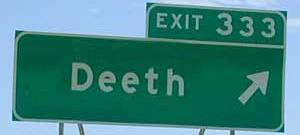A question I often get: "Why doesn't The Party DO" such and such. Usually it's in the context of "Why doesn't The Party make such and such elected official(s) act in a certain way." Second most common: "How can I get The Party to stop calling me at dinner time?"
Here's the thing about the American system: There is no such thing as THЗ PAЯTУ in the monolithic, Soviet sense. The definition of "the party" depends on the context.
There is a county party and a state party and a congressional district party and a Senate congressional campaign committee and a House congressional campaign committee and a state legislative campaign fund. Not to mention the candidates: local and state and federal all the way up to presidential. (And if you want to stop getting phone calls you have to telll ALL of them... and political groups are exempt from the national Do Not Call laws because, well, who wrote the law?)
The closest thing to The Party, a national convention, is just once every four years and really just for a couple narrow and frankly antiquated purposes; the last time we went into a national convention with any legitimate doubt as to who would be nominated was the `76 Republican convention.
The issue came up in a now-deleted Facebook thread: Will "The Democratic Party" support Candidate X, described charitably as "outside the party mainstream," if she's nominated? Can't The Party DO something? (Not naming any names but her initials are Swati Dandekar.)
Nomination politics are the broadest definition of "the party" we have. The party is anyone who chooses to vote in the primary. In an open primary state (which Iowa de facto is) that includes a certain number of crossover Republicans, independents, Greens, Libertarians, Whigs, Know Nothings, Bull Moosers and members of the Silly Party. The other levels of The Party are charged with electing the primary winner, but can't really control that process.
The ultimate job of a party is to elect its candidates. To a certain extent, a person who buys into a political process buys into the outcome. That's why it's so controversial for party activists to reject a primary nominee to openly support a different candidate. There's even rules against it at some levels.
Ironically, one of the few times I've seen a political party scuttle its own nominee was in Swati Dandekar's first race in 2002. Her opponent was caught sending emails with ugly racial undertones, and the Iowa GOP pulled the plug. Dandekar deserves to be bashed for a lot of things, but her heritage isn't one of those things.
Sure, a lot of people quietly leave a line blank on a ballot or silently vote for someone else. But some folks aren't satisfied with that. That's why some people are better suited to help individual candidates or for issue activism.
But with the white Southern realignment to the Republicans now complete, there are no more truly conservative Democrats or truly liberal Republicans. The bluest blue dog Democrat is more progressive than the RINOest Republican.
As for me, the Democratic Party isn't perfect. The social movements of the 60s dragged us kicking and screaming sometimes. But with that important caveat, the Democratic Party has been the most substantive force for progressive change in America for the last 80 years, and that's why I put my efforts into a party. Whatever a party is.

No comments:
Post a Comment